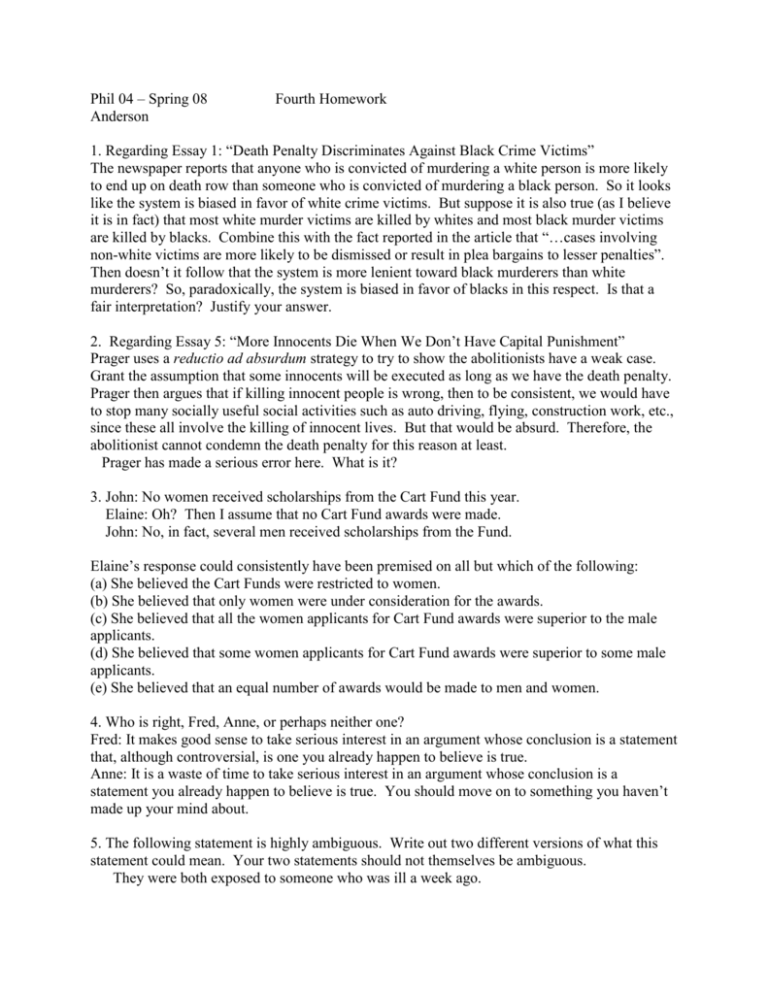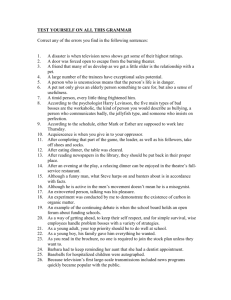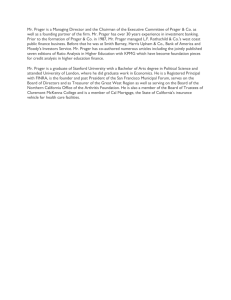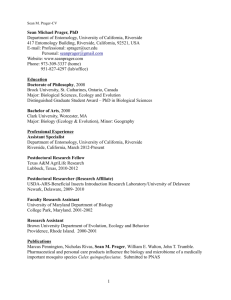Phil 04 – Spring 08 Fourth Homework
advertisement

Phil 04 – Spring 08 Anderson Fourth Homework 1. Regarding Essay 1: “Death Penalty Discriminates Against Black Crime Victims” The newspaper reports that anyone who is convicted of murdering a white person is more likely to end up on death row than someone who is convicted of murdering a black person. So it looks like the system is biased in favor of white crime victims. But suppose it is also true (as I believe it is in fact) that most white murder victims are killed by whites and most black murder victims are killed by blacks. Combine this with the fact reported in the article that “…cases involving non-white victims are more likely to be dismissed or result in plea bargains to lesser penalties”. Then doesn’t it follow that the system is more lenient toward black murderers than white murderers? So, paradoxically, the system is biased in favor of blacks in this respect. Is that a fair interpretation? Justify your answer. 2. Regarding Essay 5: “More Innocents Die When We Don’t Have Capital Punishment” Prager uses a reductio ad absurdum strategy to try to show the abolitionists have a weak case. Grant the assumption that some innocents will be executed as long as we have the death penalty. Prager then argues that if killing innocent people is wrong, then to be consistent, we would have to stop many socially useful social activities such as auto driving, flying, construction work, etc., since these all involve the killing of innocent lives. But that would be absurd. Therefore, the abolitionist cannot condemn the death penalty for this reason at least. Prager has made a serious error here. What is it? 3. John: No women received scholarships from the Cart Fund this year. Elaine: Oh? Then I assume that no Cart Fund awards were made. John: No, in fact, several men received scholarships from the Fund. Elaine’s response could consistently have been premised on all but which of the following: (a) She believed the Cart Funds were restricted to women. (b) She believed that only women were under consideration for the awards. (c) She believed that all the women applicants for Cart Fund awards were superior to the male applicants. (d) She believed that some women applicants for Cart Fund awards were superior to some male applicants. (e) She believed that an equal number of awards would be made to men and women. 4. Who is right, Fred, Anne, or perhaps neither one? Fred: It makes good sense to take serious interest in an argument whose conclusion is a statement that, although controversial, is one you already happen to believe is true. Anne: It is a waste of time to take serious interest in an argument whose conclusion is a statement you already happen to believe is true. You should move on to something you haven’t made up your mind about. 5. The following statement is highly ambiguous. Write out two different versions of what this statement could mean. Your two statements should not themselves be ambiguous. They were both exposed to someone who was ill a week ago. Problems 6-8, supply the missing premise to make a deductively valid argument. 6. If the Nerdic computer runs Wordswift software, then it can meet my computing needs. Therefore, the Nerdic computer can meet my computing needs. 7. If a person is superstitious, he believes in fortune tellers. Therefore, some people are not superstitious. 8. Somebody in the house ate the last piece of cake. It couldn’t have been Junior, because he was asleep at the time. It couldn’t have been Mom, because she is allergic to chocolate. It wasn’t me. It must have been Dad. Problems 9-11, supply the missing premise to make the argument inductively strong. 9. Miriam was in the library when the books were stolen from the librarian’s desk. She was also seen hanging around the desk. So she’s probably the one who stole them. 10. If the president needs more money to balance the federal budget, he will get it from Social Security. Well, he’s almost certainly going to get it from Social Security. 11. John has a typical American diet. His fat intake is probably excessively high. 12. Rewrite the argument #19 on page 115 of the text in proper form. That will involve omitting anything the author says that is not either a support claim (premise) or the conclusion. Note also that several of the author’s points are grammatically in the form of questions. They should be rewritten as statements. Be sure and label which statement is the conclusion. 13. Extra Credit. Sidney Wickover was lost deep in the darkest reaches of Kansas. While walking along the Yellow Brick Road, which he hoped would return him to the Industrial Diamond City, he encountered a fork. He knew that one road must take him to the City and the other to the castle of the wicked witch of Topeka. He saw a farmer standing in his cornfield. Sidney knew that there were two tribes of farmers in this region, one of which always told the truth and another that always told the opposite of the truth. Sidney only had time to ask one question of the farmer for an ominous dark vortex was about to overtake him. Which one of the following questions would ensure Sidney of finding the right road? (a) If I asked you “Is this the road to town?” (while pointing at one of the roads), would you say yes? (b) If I asked you “Is this the road to town?” (while pointing at one of the roads), would you tell the truth? (c) If I asked you “Is this the road to town?” (while pointing at one of the roads), would you tell a lie? (d) Which is the road to town? (e) Is this not the road that does not lead to town?








